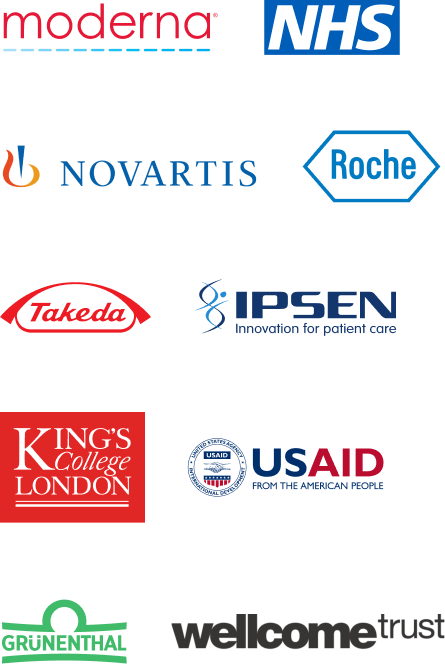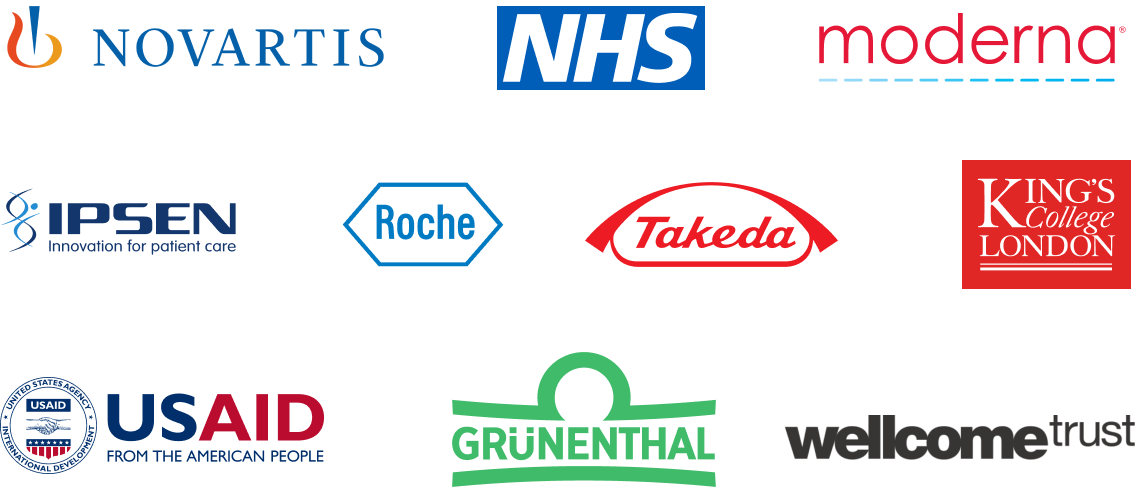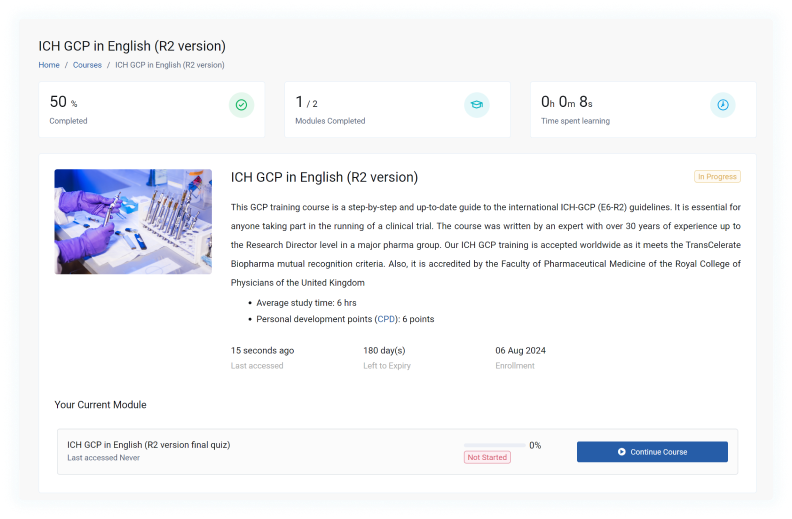Course Syllabus
- The History of GCP: Part 1
- The History of GCP: Part 2
- What is GCP?
- Introduction to GCP (Mini-Exam)
- How was GCP Introduced to the UK
- The Principles of ICH GCP
- Additional Learning Points
- Documentation and Version Control
- Quality Assurance (QA)
- MHRA GCP Inspections
- Key Resources
- Introduction to GCP (Webinar)
- Introduction
- Responsibilities of the CA
- Responsibilities of the IEC
- Subject Informed Consent Forms (ICF): Part 1
- Subject Informed Consent Forms (ICF): Part 2
- Composition, Functions, Operations, Procedures, and Records
- Introduction
- Investigator Responsibilities
- Investigator Qualifications and Agreements
- Adequate Resources
- Medical Care of Trial Subjects
- Communication with IRB/IEC
- Compliance with the Protocol
- Investigational Medicinal Products (IMPs)
- Randomisation Procedures and Un-blinding
- Informed Consent of Trial Participants
- Informed Consent of Trial Participants: The Consent Discussion
- Informed Consent of Trial Participants: Obtaining Consent Subjects Who Cannot Read or Write
- Informed Consent of Trial Participants: Obtaining Consent of Minors and “Mentally Incompetent” Subjects
- Informed Consent of Trial Participants: Obtaining Consent and Incapacitated Subjects
- Informed Consent of Trial Participants: Updating Consent
- Records and Reports: Introduction
- Records and Reports: Study Site Files
- Records and Reports: Updates & Amendments
- Records and Reports: Source Documents
- Records and Reports: Financial Information
- Records and Reports: The Case Record Form (CRF)
- Records and Reports: Recording Subject Data
- Premature Termination or Suspension of a Trial
- Progress Reports and Final Reports by Investigator
- Archiving
- Introduction
- Quality Management: Part 1
- Quality Management: Part 2
- QA and QC (Quality Assurance and Quality Control): Part 1
- QA and QC (Quality Assurance and Quality Control): Part 2 – Standard Operating Procedures (SOPs)
- QA and QC (Quality Assurance and Quality Control) – Contracts and Agreements
- Contract Research Organisations
- Trial Design
- Trial Management: Part 1
- Trial Management: Part 2 – Data Management
- Trial Management: Part 3 – Electronic Data Systems
- Trial Management: Part 4 – Record Keeping
- Investigator Selection: Introduction
- Investigator Selection: Permissions
- Investigator Selection: Responsibilities
- Investigator Selection: Compensation
- Financing
- Notification/ Submission to Regulatory Authorities
- Gaining CA Approval in the EU
- Confirmation of Review by IRB/IEC
- Manufacturing, Packaging, Labelling, and Coding Investigational Products: Part 1
- Manufacturing, Packaging, Labelling, and Coding Investigational Products: Part 2
- Supplying and Handling Investigational Products
- Audit and Inspection
- Noncompliance
- Premature Termination or Suspension of a Trial
- Clinical Trial/Study Reports
- Multicentre Trials
- Introduction
- Monitoring: Part 1
- Monitoring: Part 2 – Monitor Responsibilities
- Monitoring: Part 3 - The Monitoring Visit
- Monitoring: Part 4 – Verification of Investigational Medicinal Products (IMP)
- Complying with the Protocol, Amendments, SOP and Guidance
- Verifying Informed Consent
- The Case Record Form (CRF) and Source Documents
- Verifying Subject Data
- Errors in CRFs
- Closing out the Monitoring Visit
- The Monitoring Report & Plan
- Quality Management - Centralised Monitoring
- Fraud and Misconduct
- Introduction
- Adverse Drug Reaction Reports: Part 1
- Adverse Drug Reaction Reports: Part 2 – Serious Adverse Events (SAEs) and Serious Adverse Drug Reactions (SADRs)
- Adverse Drug Reaction Reports: Part 3 – Suspected Unexpected Serious Adverse Reactions (SUSARs)
- Adverse Drug Reaction Reports: Part 4 – Adverse Events of Special Interest
- Adverse Drug Reaction Reports: Part 5 – Periodic Safety Reports
- Adverse Drug Reaction Reports: Part 6 – Reporting Decision Tree
- Introduction
- Protocol Structure and Content: Part 1
- Protocol Structure and Content: Part 2 – Selection and Withdrawal of Subjects
- Treatment of Subjects
- Introduction
- Table of Contents of Investigator's Brochure (Example)
- Introduction
- Essential Documents
- Archiving
- Documents to be Present Pre-Study
- Documents to be Present During the Study
- Documents to be Present Post-Study
- Glossary & Abbreviations
- Useful Reference Documents List
Our GCP certified customers


Good Clinical Practice (GCP) training is a vital educational programme designed to equip clinical trial professionals and researchers with the essential knowledge of ethical and scientific standards required for conducting top-tier clinical studies. This comprehensive course covers the globally recognised guidelines set forth by the International Council for Harmonisation (ICH).
The core objectives of GCP training include:
- Safeguarding the rights, safety, and welfare of human participants
- Upholding the reliability and integrity of clinical trial data
- Fostering uniform, high-calibre practices across all clinical research domains
Our Whitehall Training GCP course thoroughly explores these crucial areas, offering learners a robust grounding in both the theoretical principles and practical applications of Good Clinical Practice. By providing a deep dive into these fundamental aspects, we ensure that participants are well-prepared to navigate the complexities of clinical research while adhering to the highest standards of ethics and scientific rigour.
Absolutely. For those involved in clinical trials, GCP certification isn't just valuable—it's essential. But even if you're not directly participating in trials, obtaining GCP certification can be incredibly beneficial:
- It demonstrates your commitment to upholding global research standards
- Your research gains enhanced credibility and quality
- You'll be well-versed in safeguarding the rights and wellbeing of trial participants
- It can open doors to exciting career opportunities in clinical research
Our Whitehall Training Good Clinical Practice Course goes beyond mere certification. We provide you with practical, hands-on knowledge that you can immediately apply in your professional life. By mastering GCP principles through our course, you'll be well-equipped to navigate the complexities of clinical research with confidence and expertise.
A broad spectrum of individuals involved in clinical research can benefit from GCP certification:
- Lead and Co-investigators: Those with primary responsibility for overseeing and conducting trials at research facilities.
- On-site Clinical Trial Personnel: This encompasses research coordinators, study nurses, and other team members directly involved in managing trial activities.
- Trial Sponsors and CROs: Professionals who oversee the planning, commencement, and documentation of clinical trials.
- Regulatory Body Representatives: Individuals tasked with monitoring and assessing trial compliance with established standards.
- Ethics Committee and IRB Members: Those responsible for reviewing and approving trial protocols to ensure ethical conduct.
- Staff at Research Institutions and Universities: Individuals ensuring that institutional research aligns with international benchmarks.
- Researchers Funded by National Health Bodies: All staff and investigators participating in nationally funded clinical trials.
The Whitehall Training Good Clinical Practice Course is designed to accommodate this diverse range of professionals, offering both fundamental GCP principles and role-specific guidance. Moreover, it's an excellent resource for those aiming to enhance their research capabilities and streamline their clinical trial processes.
Our GCP training course is a comprehensive guide to the ICH-GCP (E6-R2) international guidelines, ensuring you meet the requirements for participation in global clinical trials. We offer this essential training in multiple languages to cater to a diverse audience.
Crafted by an industry veteran with over three decades of experience, including a stint as Research Director at a leading pharmaceutical company, our course provides in-depth knowledge of the most recent ICH-GCP (E6-R2) guidelines. It's an indispensable resource for anyone involved in clinical trial management.
The course boasts accreditation from the Faculty of Pharmaceutical Medicine of the Royal College of Physicians in the UK, underscoring its quality and relevance. Beyond English, we've made the course accessible in nine additional languages, including German, French, Italian, and Japanese, among others. We also offer tailored versions that align with specific regulatory frameworks in various countries and regions.
Our training stands out with its user-friendly design, featuring clear visuals that facilitate easy cross-referencing with the ICH-GCP E6 document. Drawing from the author's extensive practical experience, the course offers valuable insights into the real-world application of Good Clinical Practice principles. As an added benefit, participants can earn 6 CPD points upon completion.
By choosing our GCP course, you're investing in a thorough, accredited, and practical learning experience that will equip you with the knowledge and skills needed to excel in the field of clinical research.
Indeed, our Good Clinical Practice (GCP) course has received endorsement from a highly respected institution in the field of pharmaceutical medicine. The Faculty of Pharmaceutical Medicine, which operates under the auspices of the Royal College of Physicians, has given its seal of approval to our training programme.
This endorsement carries significant weight in the industry. The Faculty, established in 1989, has long been recognised as a leading authority in setting and maintaining exacting standards for pharmaceutical research and practice in the United Kingdom. Their backing of our course serves as a testament to its quality and relevance.
By completing our GCP course, you'll earn a certificate that is widely acknowledged within the pharmaceutical and clinical research sectors. This recognition can be a valuable asset in your professional development, demonstrating your commitment to upholding the highest standards in clinical practice.
The price of GCP certification can vary significantly based on several key factors:
- Official recognition: Has the course received approval from reputable organisations?
- International compliance: Does the training meet ICH standards, allowing participation in global clinical trials?
- Content quality: Is the material current and authored by industry professionals?
- Duration of access: For how long can learners use the course resources?
Our Whitehall Training GCP course is priced at £79, offering excellent value due to its:
- Recognition: Accredited by the Royal College of Physicians, awarding 6 CPD points.
- Global acceptance: Aligns with ICH E6(R2) guidelines, enabling involvement in international clinical trials.
- Expert-led content: Developed by our GCP specialist, Lucy Parker, who brings over 10 years of experience managing research across major institutions, including the NHS.
- Lifelong learning: We provide unlimited access to course materials, supporting ongoing professional development.
For team purchases, we offer a 10% discount on orders of 5 licences at checkout. If you're interested in larger group discounts, please contact our team for a tailored quote.
Indeed, some GCP training options are offered at no cost. However, it's important to be aware of their potential drawbacks:
- The content may be subpar or outdated, often lacking accreditation
- They typically don't provide official certification, which is crucial for conducting clinical research
While these free courses might serve as a basic introduction to GCP principles, they're generally insufficient for those intending to actively participate in clinical trials.
Our Whitehall Training Good Clinical Practice Course, on the other hand, offers comprehensive, up-to-date content that's fully accredited. It provides the official certification necessary for researchers to engage in clinical studies. Moreover, our course delves into specific aspects relevant to the UK market, offering valuable insights for those working within or collaborating with British research institutions.
Whitehall Training's GCP course offers a comprehensive exploration of the ethical and scientific principles crucial for executing clinical trials with integrity. Our programme is thoughtfully structured to cater to learners across various experience levels, from those new to the field to seasoned professionals seeking to refresh their knowledge.
The curriculum delves into a wide array of essential subjects, including:
- The historical context and fundamental tenets of GCP
- Delineation of duties for investigators, sponsors, and monitors
- Ethical frameworks and procedures for obtaining informed consent
- Crafting and adhering to robust protocols
- Vigilant management of safety concerns and adverse incidents
- Upholding data quality and integrity
- Navigating regulatory landscapes and liaising with authorities
- Best practices in documentation and record maintenance
- Proper handling of investigational medicinal products
- Effective site administration and monitoring techniques
Our course employs a variety of engaging e-learning methodologies to ensure an immersive and productive educational journey:
- In-depth instructional materials
- Authentic case studies drawn from industry experiences
- Dynamic quizzes and knowledge assessments
- Practical illustrations of best practices
- Reflective exercises to encourage personal application of concepts
This carefully curated approach ensures that participants not only grasp the theoretical aspects of GCP but also gain practical insights that can be readily applied in their professional roles.
Acquiring your Good Clinical Practice certificate involves a simple two-stage process:
- Work through the interactive educational content provided in our course.
- Successfully complete the online assessment at the end of the training.
Feeling apprehensive about the GCP exam? There's no need to worry. The assessment is merely a means to confirm your readiness for research participation. Should you not pass on your first attempt, you can easily revisit any areas where you need additional understanding using our comprehensive resource library, and then retake the exam.
Our Whitehall Training Good Clinical Practice Course is designed to make this process as smooth and informative as possible, ensuring you gain the knowledge and confidence needed to excel in clinical research settings.
Our Good Clinical Practice course is structured to ensure that participants not only absorb the material but can also implement it effectively in real-world clinical research environments. To achieve this, we've incorporated a variety of evaluation methods throughout the learning journey:
- Continuous Evaluation: As learners progress through the modules, they'll encounter interactive quizzes and real-world scenarios. These serve to reinforce key concepts and allow participants to measure their understanding along the way.
- Comprehensive Final Assessment: The course concludes with a thorough examination that evaluates the learner's understanding of GCP principles and practices. This assessment covers all major areas covered in the course, including:
- Ethics in clinical research
- Regulatory compliance and requirements
- Clinical trial roles and responsibilities
- Quality management and data integrity
- Adverse event handling and safety reporting
- Practical Knowledge Application: The final assessment includes questions designed to test the learner's ability to apply GCP principles to realistic clinical trial situations.
To ensure that learners are fully equipped to conduct their trials, passing the final assessment is a requirement for obtaining GCP certification. We understand that everyone learns at their own pace, which is why learners can take the final assessment as many times as needed. This approach ensures that all participants can achieve the required level of understanding and become GCP qualified.
Our Good Clinical Practice course is tailored to suit a broad spectrum of professionals in the clinical research field. Whilst prior knowledge of clinical research can be advantageous, it's not essential for enrolling. We've thoughtfully structured the content to cater to individuals with varying levels of expertise and diverse roles within the clinical trial sector.
This training proves particularly beneficial for:
- Research Nurses
- Clinical Trial Coordinators
- Lead Investigators and Co-Investigators
- Study Managers
- Statistics and Data Management Professionals
- Specialists in Regulatory Affairs
- Quality Control Experts
- Members of Ethics Committees
- Clinical Trial Pharmacists
- Personnel from Sponsoring Organisations and Contract Research Organisations
The course is equally suitable for those embarking on their clinical research journey and seasoned professionals seeking to enhance their existing knowledge. It offers a thorough exploration of Good Clinical Practice principles and their real-world implementation, ensuring relevance for all participants regardless of their current level of experience.
Yes, Whitehall Training's Good Clinical Practice Course is fully accessible via the internet. This digital format offers several benefits to our learners:
-Flexible learning: You can work through the course materials at your own rhythm, allowing you to absorb the information thoroughly without feeling rushed. This approach accommodates various learning styles and personal timetables.
-Easy accessibility: The course content is available round-the-clock on any internet-enabled device. Whether you're at home, in the office, or on the move, you can continue your learning journey without interruption.
This online approach ensures that you can fit your GCP training around your existing commitments, making it an ideal choice for busy professionals in the clinical research field.
The International Council for Harmonisation, or ICH, plays a crucial role in shaping global pharmaceutical research standards, including Good Clinical Practice (GCP). Here's what you need to know:
-ICH is a collaborative effort, uniting regulatory bodies and pharmaceutical industry experts.
-It establishes globally-recognised guidelines for conducting clinical trials.
-The ICH GCP guidelines are designed to safeguard trial participants and maintain data integrity.
-These guidelines undergo regular updates, with ICH GCP E6(R2) being the most recent iteration.
Adhering to these ICH guidelines is essential for conducting compliant clinical trials worldwide. That's precisely why we've developed our Good Clinical Practice course. It provides comprehensive coverage of all 13 core ICH GCP principles, equipping you with the knowledge needed to conduct research that aligns with international standards. Our course also offers valuable insights into how these principles apply specifically to the UK market, giving you a more tailored understanding of GCP implementation.
The ICH GCP E6 (R2) guidelines, published in 2016, represent the latest iteration of Good Clinical Practice standards set forth by the International Council for Harmonisation of Technical Requirements for Pharmaceuticals for Human Use. This update marks a substantial progression in GCP protocols, mirroring the evolving nature of clinical research.
It's essential for clinical research professionals to be well-versed in ICH GCP E6 (R2) for several reasons:
- These guidelines establish the current worldwide benchmark for ethically sound and scientifically rigorous clinical trials.
- Regulatory bodies across the globe often mandate adherence to these standards.
- They play a crucial role in safeguarding trial participants and ensuring the integrity of research data.
- Many research institutions and pharmaceutical companies expect their teams and collaborators to be well-acquainted with and follow these updated guidelines.
The Whitehall Training Good Clinical Practice course offers comprehensive coverage of ICH GCP E6 (R2). Our programme ensures that learners gain a thorough understanding of these revised guidelines, enabling them to implement them effectively in their clinical research endeavours.
The International Council for Harmonisation's Good Clinical Practice (ICH GCP) guidelines are founded on 13 essential principles that establish the ethical and scientific framework for clinical research. These core tenets include:
- Conducting research ethically
- Ensuring benefits surpass risks
- Protecting participants' rights and well-being
- Providing sufficient supporting evidence
- Developing scientifically robust protocols
- Obtaining IRB/IEC approval
- Ensuring qualified medical oversight
- Employing competent investigators
- Acquiring informed consent
- Maintaining precise data records and reports
- Safeguarding confidentiality
- Adhering to good manufacturing practices for investigational products
- Implementing quality assurance systems
The Whitehall Training Good Clinical Practice course offers comprehensive instruction on these principles, equipping you with the knowledge to effectively implement them in practical clinical research scenarios. Our programme delves into the nuances of each principle, providing you with a thorough understanding of their application in various research contexts.

